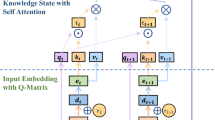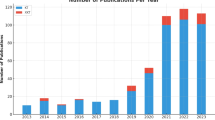Abstract
As a prominent aspect of modeling learners in the education domain, knowledge tracing attempts to model learner’s cognitive process, and it has been studied for nearly 30 years. Driven by the rapid advancements in deep learning techniques, deep neural networks have been recently adopted for knowledge tracing and have exhibited unique advantages and capabilities. Due to the complex multilayer structure of deep neural networks and their ”black box” operations, these deep learning based knowledge tracing (DLKT) models also suffer from non-transparent decision processes. The lack of interpretability has painfully impeded DLKT models’ practical applications, as they require the user to trust in the model’s output. To tackle such a critical issue for today’s DLKT models, we present an interpreting method by leveraging explainable artificial intelligence (xAI) techniques. Specifically, the interpreting method focuses on understanding the DLKT model’s predictions from the perspective of its sequential inputs. We conduct comprehensive evaluations to validate the feasibility and effectiveness of the proposed interpreting method at the skill-answer pair level. Moreover, the interpreting results also capture the skill-level semantic information, including the skill-specific difference, distance and inner relationships. This work is a solid step towards fully explainable and practical knowledge tracing models for intelligent education.








Similar content being viewed by others
Explore related subjects
Discover the latest articles, news and stories from top researchers in related subjects.Availability of Data, Material and Code
Data and materials created for this research are available upon request. Please direct all inquiries to the corresponding author.
References
Abdelrahman, G., & Wang, Q. (2019). Knowledge tracing with sequential key-value memory networks. In Proceedings of the 42nd international ACM SIGIR conference on research and development in information retrieval (pp. 175–184).
Andrea, S., Stefano, T., Francesca, C., & Ratto, M. (2004). Sensitivity analysis in practice: a guide to assessing scientific models. Hoboken: Wiley.
Arras, L., Montavon, G., Müller, K.R., & Samek, W. (2017). Explaining recurrent neural network predictions in sentiment analysis. EMNLP, 2017, 159.
Bach, S., Binder, A., Montavon, G., Klauschen, F., Muller, K., & Samek, W. (2015). On pixel-wise explanations for non-linear classifier decisions by layer-wise relevance propagation. Plos One, 10(7), 0130140.
Baker, R.S., Corbett, A.T., & Aleven, V. (2008). More accurate student modeling through contextual estimation of slip and guess probabilities in bayesian knowledge tracing. In International conference on intelligent tutoring systems (pp. 406–415). Springer.
Baker, R.S., Goldstein, A.B., & Heffernan, N.T. (2011). Detecting learning moment-by-moment. International Journal of Artificial Intelligence in Education, 21(1-2), 5–25.
Borgatti, S.P., & Cross, R. (2003). A relational view of information seeking and learning in social networks. Management Science, 49(4), 432–445.
Borgatti, S.P., Everett, M.G., & Freeman, L.C. (2002). Ucinet for windows: Software for social network analysis, (p. 6). Harvard: Analytic Technologies.
Cen, H., Koedinger, K.R., & Junker, B.W. (2006). Learning factors analysis – a general method for cognitive model evaluation and improvement. In Proceedings of international conference on intelligent tutoring systems (pp. 164–175).
Chaudhry, R., Singh, H., Dogga, P., & Saini, SK (2018). Modeling hint-taking behavior and knowledge state of students with multi-task learning. In Proceedings of educational data mining.
Chen, P., Lu, Y., Zheng, V.W., & Pian, Y. (2018). Prerequisite-driven deep knowledge tracing. In 2018 IEEE international conference on data Mining (ICDM) (pp. 39–48). IEEE.
Chen, Y., Liu, Q., Huang, Z., Wu, L., Chen, E., Wu, R., Su, Y., & Hu, G. (2017). Tracking knowledge proficiency of students with educational priors. In Proceedings of the 2017 ACM on conference on information and knowledge management (pp. 989–998). ACM.
Cho, K., Van Merriënboer, B., Bahdanau, D., & Bengio, Y. (2014). On the properties of neural machine translation: Encoder-decoder approaches. arXiv:14091259.
Corbett, A.T., & Anderson, J.R. (1994). Knowledge tracing: Modeling the acquisition of procedural knowledge. User modeling and user-adapted interaction, 4(4), 253–278.
David, H., et al. (2018). Knowledge tracing using the brain. In Proceedings of the educational data mining (EDM).
Deng, H. (2019). Interpreting tree ensembles with intrees. International Journal of Data Science and Analytics, 7, 277–287.
Feng, M., Heffernan, N., & Koedinger, K. (2009). Addressing the assessment challenge with an online system that tutors as it assesses. User Modeling and User-Adapted Interaction, 19(3), 243–266.
Ghosh, A., Heffernan, N., & Lan, A.S. (2020). Context-aware attentive knowledge tracing. In Proceedings of the 26th ACM SIGKDD international conference on knowledge discovery & data mining (pp. 2330–2339).
Grégoire, M., Wojciech, S., & Klaus-Robert, M. (2018). Methods for interpreting and understanding deep neural networks. Digital Signal Processing, 73, 1–15.
Hochreiter, S., & Schmidhuber, J. (1997). Long short-term memory. Neural Computation, 9(8), 1735–1780.
Khajah, M., Lindsey, R.V., & Mozer, M.C. (2016). How deep is knowledge tracing? arXiv:160402416.
Knoke, D., & Yang, S. (2019). Social network analysis Vol. 154. Thousand Oaks: Sage Publications.
Lapuschkin, S., Binder, A., Montavon, G., Muller, K., & Samek, W. (2016). Analyzing classifiers: Fisher vectors and deep neural networks. In Proceedings of IEEE conference on computer vision and pattern recognition (CVPR) (pp. 2912–2920).
Liu, Q., Huang, Z., Yin, Y., Chen, E., Xiong, H., Su, Y., & Hu, G. (2019). Ekt: Exercise-aware knowledge tracing for student performance prediction. IEEE Transactions on Knowledge and Data Engineering, 33 (1), 100–115.
Liu, R., & Koedinger, K.R. (2017). Towards reliable and valid measurement of individualized student parameters. In Proceedings of the 10th international conference on educational data mining (pp. 135–142).
Lu, Y., Wang, D., Meng, Q., & Chen, P. (2020). Towards interpretable deep learning models for knowledge tracing. In International conference on artificial intelligence in education (pp. 185–190). Springer.
Mashayekhi, M., & Gras, R. (2015). Rule extraction from random forest: the rf+ hc methods. In Proceedings of canadian conference on artificial intelligence (pp. 223–237).
Melis, D.A., & Jaakkola, T.S. (2018). Towards robust interpretability with self-explaining neural networks. In Proceedings of advances in neural information processing systems(NIPS) (pp. 7786–7795).
Montavon, G., Binder, A., Lapuschkin, S., Samek, W., & Müller, K.R. (2019). Layer-wise relevance propagation: an overview. In Explainable AI: interpreting, explaining and visualizing deep learning (pp. 193–209).
Montero, S., Arora, A., Kelly, S., Milne, B., & Mozer, M. (2018). Does deep knowledge tracing model interactions among skills?. In Proceedings of the 11th international conference on educational data mining.
Nagatani, K., Zhang, Q., Sato, M., Chen, Y.Y., Chen, F., & Ohkuma, T. (2019). Augmenting knowledge tracing by considering forgetting behavior. In The world wide web conference (pp. 3101–3107).
Pandey, S., & Karypis, G. (2019). A self-attentive model for knowledge tracing. arXiv:190706837.
Pappano, L. (2012). The year of the mooc. The New York Times, 2(12), 2012.
Pardos, Z.A., & Heffernan, N.T. (2011). Kt-idem: introducing item difficulty to the knowledge tracing model. In International conference on user modeling, adaptation, and personalization (pp. 243–254). Berlin: Springer.
Pardos, Z.A., Bergner, Y., Seaton, D.T., & Pritchard, D.E. (2013). Adapting bayesian knowledge tracing to a massive open online course in edx. EDM, 13, 137–144.
Pavlik, Jr, P.I., Cen, H., & Koedinger, K.R. (2009). Performance factors analysis–a new alternative to knowledge tracing. In Proceedings of international conference on artificial intelligence in education.
Piech, C., Bassen, J., Huang, J., Ganguli, S., Sahami, M., Guibas, L.J., & Sohl-Dickstein, J. (2015). Deep knowledge tracing. In Advances in neural information processing systems (pp. 505–513).
Poulin, B., Eisner, R., Szafron, D., Lu, P., Greiner, R., Wishart, D.S., Fyshe, A., Pearcy, B., Macdonell, C., & Anvik, J. (2006). Visual explanation of evidence in additive classifiers. In Proceedings of national conference on artificial intelligence (pp. 1822–1829).
Rumelhart, D.E., Hinton, G.E., & Williams, R.J. (1988). Learning representations by back-propagating errors. Nature, 323(6088), 696–699.
Santoro, A., Bartunov, S., Botvinick, M., Wierstra, D., & Lillicrap, T. (2016). Meta-learning with memory-augmented neural networks. In Proceedings of international conference on machine learning (pp. 1842–1850).
Schuster, M., & Paliwal, K.K. (1997). Bidirectional recurrent neural networks. IEEE Transactions on Signal Processing, 45(11), 2673–2681.
Strumbelj, E., & Kononenko, I. (2010). An efficient explanation of individual classifications using game theory. Journal of Machine Learning Research, 11, 1–18.
Su, Y., Liu, Q., Liu, Q., Huang, Z., Yin, Y., Chen, E., Ding, C., Wei, S., & Hu, G. (2018). Exercise-enhanced sequential modeling for student performance prediction. In Thirty-Second AAAI Conference on Artificial Intelligence.
Tan, S., Caruana, R., Hooker, G., & Lou, Y. (2018). Distill-and-compare: Auditing black-box models using transparent model distillation. In Proceedings of AAAI/ACM conference on AI, ethics, and society (pp. 303–310).
Thai-Nghe, N., Drumond, L., Horváth, T, Krohn-Grimberghe, A., Nanopoulos, A., & Schmidt-thieme, L. (2012). Factorization techniques for predicting student performance. In Educational recommender systems and technologies: Practices and challenges, IGI Global (pp. 129–153).
Tong, H., Zhou, Y., & Wang, Z. (2020). Exercise hierarchical feature enhanced knowledge tracing. In International conference on artificial intelligence in education (pp. 324–328). Springer.
Vaswani, A., Shazeer, N., Parmar, N., Uszkoreit, J., Jones, L., Gomez, A.N., Kaiser, L., & Polosukhin, I. (2017). Attention is all you need. arXiv:170603762.
Vie, J., & Kashima, H. (2019). Knowledge tracing machines: Factorization machines for knowledge tracing. In Proceedings of AAAI conference on artificial intelligence, (Vol. 33 pp. 750–757).
Wang, L., Sy, A., Liu, L., & Piech, C. (2017). Deep knowledge tracing on programming exercises. In Proceedings of the fourth (2017) ACM conference on learning@ scale (pp. 201–204).
Wang, Z., Zhu, J., Li, X., Hu, Z., & Zhang, M. (2016). Structured knowledge tracing models for student assessment on coursera. In Proceedings of the third (2016) ACM conference on learning@ scale (pp. 209–212).
Wilson, K.H., Xiong, X., Khajah, M., Lindsey, R.V., Zhao, S., Karklin, Y., Van Inwegen, E.G., Han, B., Ekanadham, C., Beck, J.E., & et al. (2016). Estimating student proficiency: Deep learning is not the panacea. In In Neural information processing systems, workshop on machine learning for education, Vol. 3.
Xiong, X., Zhao, S., Van Inwegen, E., & Beck, J. (2016). Going deeper with deep knowledge tracing. In EDM (pp. 545–550).
Xu, F., Uszkoreit, H., Du, Y., Fan, W., Zhao, D., & Zhu, J. (2019). Explainable ai: A brief survey on history, research areas, approaches and challenges. In CCF international conference on natural language processing and Chinese computing (pp. 563–574). Springer.
Yang, H., & Cheung, L.P. (2018). Implicit heterogeneous features embedding in deep knowledge tracing. Cognitive Computation, 10(1), 3–14.
Yazdani, M. (1989). Intelligent tutoring systems survey. Artificial Intelligence Review, 1(1), 43–52.
Yeung, C. (2019). Deep-irt: Make deep learning based knowledge tracing explainable using item response theory. In Proceedings of educational data mining.
Yeung, C.K., & Yeung, D.Y. (2018). Addressing two problems in deep knowledge tracing via prediction-consistent regularization. In Proceedings of the fifth annual ACM conference on learning at scale. 5: ACM.
Yudelson, M.V., Koedinger, K.R., & Gordon, G.J. (2013). Individualized bayesian knowledge tracing models. In International conference on artificial intelligence in education (pp. 171–180). Springer.
Zeiler, M.D., & Fergus, R. (2014). Visualizing and understanding convolutional networks. In Proceedings of european conference on computer vision (pp. 818–833).
Zhang, J., Shi, X., King, I., & Yeung, D.Y. (2017a). Dynamic key-value memory networks for knowledge tracing. In Proceedings of the 26th international conference on world wide web (pp. 765–774).
Zhang, L., Xiong, X., Zhao, S., Botelho, A., & Heffernan, N.T. (2017b). Incorporating rich features into deep knowledge tracing. In Proceedings of the fourth (2017) ACM conference on learning@ scale (pp. 169–172).
Acknowledgements
This research is partially supported by National Natural Science Foundation of China (No. 62077006 and No.62177009), Open Project of the State Key Laboratory of Cognitive Intelligence (No. iED2021-M007) and the Fundamental Research Funds for the Central Universities.
Author information
Authors and Affiliations
Contributions
All authors contributed to the system design and implementation. Algorithm design, data collection and analysis were performed by all authors. The first draft of the manuscript was written by Yu Lu and Deliang Wang, and all authors commented on previous versions of the manuscript. All authors read and approved the final manuscript.
Corresponding author
Ethics declarations
Conflict of Interests
The authors declare that they have no conflict of interest.
Additional information
Publisher’s Note
Springer Nature remains neutral with regard to jurisdictional claims in published maps and institutional affiliations.
Rights and permissions
About this article
Cite this article
Lu, Y., Wang, D., Chen, P. et al. Interpreting Deep Learning Models for Knowledge Tracing. Int J Artif Intell Educ 33, 519–542 (2023). https://doi.org/10.1007/s40593-022-00297-z
Accepted:
Published:
Issue Date:
DOI: https://doi.org/10.1007/s40593-022-00297-z




